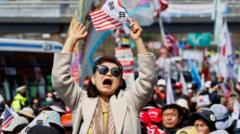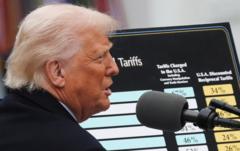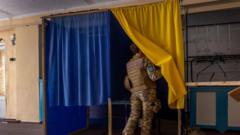The Constitutional Court's unanimous decision to uphold the impeachment of President Yoon Suk Yeol marks a significant turning point in South Korea, as the country grapples with the fallout of his failed martial law declaration and seeks to find unity amidst political strife. With a snap election mandated by June 3, South Koreans are left to navigate a deeply polarized environment while confronting the implications of Yoon's controversial legacy.
South Korea's Political Turmoil: The Fallout from Yoon Suk Yeol's Impeachment

South Korea's Political Turmoil: The Fallout from Yoon Suk Yeol's Impeachment
The removal of President Yoon Suk Yeol opens a new chapter in South Korea's political landscape marred by division and unrest.
Amid scenes of celebration and sorrow, South Korea processed the removal of President Yoon Suk Yeol, a decision reached by the Constitutional Court after a tumultuous political saga ignited by Yoon's attempted imposition of martial law in December. This evening is pivotal for the nation, representing both the end of Yoon's embattled leadership and the beginning of a lengthy journey towards healing and governance.
Yoon's rise to power has been characterized by sharp political divisions, further exacerbated by his claims of infiltration by foreign "anti-state forces" and a conspiracy theory-laden rhetoric that has gained traction among his supporters. The aftermath of his controversial military takeover and the perception of ongoing threats to democracy evoke memories of South Korea's authoritarian past, stoking fears of potential future power grabs.
As the country gears up for a snap election expected to follow the ruling, there are calls for constitutional reform to safeguard democratic principles against the excesses of presidential power. Yet, political analysts warn of the challenges ahead, as a significant portion of the populace remains distrustful of the judicial process and the electoral system.
Political experts emphasize that unity and collaboration will be essential in the coming months as South Korea seeks a leader capable of bridging the existing divide and addressing pressing issues, not least the economic ramifications of international relations, particularly with the U.S. under President Trump.
While Yoon Suk Yeol faces insurrection charges and a harrowing political legacy, the unfolding drama in South Korea presents both challenges and opportunities for a nation determined to reclaim its democratic integrity amid a turbulent political climate.
Moving forward, the question looms: Can South Korea find a path to political stability, or will the shadow of division linger as it navigates these critical transitions?
South Koreans look to the future as they seek healing and unity in an era marked by political upheaval, questioning the direction their democracy will take in the wake of Yoon's ouster.
Yoon's rise to power has been characterized by sharp political divisions, further exacerbated by his claims of infiltration by foreign "anti-state forces" and a conspiracy theory-laden rhetoric that has gained traction among his supporters. The aftermath of his controversial military takeover and the perception of ongoing threats to democracy evoke memories of South Korea's authoritarian past, stoking fears of potential future power grabs.
As the country gears up for a snap election expected to follow the ruling, there are calls for constitutional reform to safeguard democratic principles against the excesses of presidential power. Yet, political analysts warn of the challenges ahead, as a significant portion of the populace remains distrustful of the judicial process and the electoral system.
Political experts emphasize that unity and collaboration will be essential in the coming months as South Korea seeks a leader capable of bridging the existing divide and addressing pressing issues, not least the economic ramifications of international relations, particularly with the U.S. under President Trump.
While Yoon Suk Yeol faces insurrection charges and a harrowing political legacy, the unfolding drama in South Korea presents both challenges and opportunities for a nation determined to reclaim its democratic integrity amid a turbulent political climate.
Moving forward, the question looms: Can South Korea find a path to political stability, or will the shadow of division linger as it navigates these critical transitions?
South Koreans look to the future as they seek healing and unity in an era marked by political upheaval, questioning the direction their democracy will take in the wake of Yoon's ouster.




















